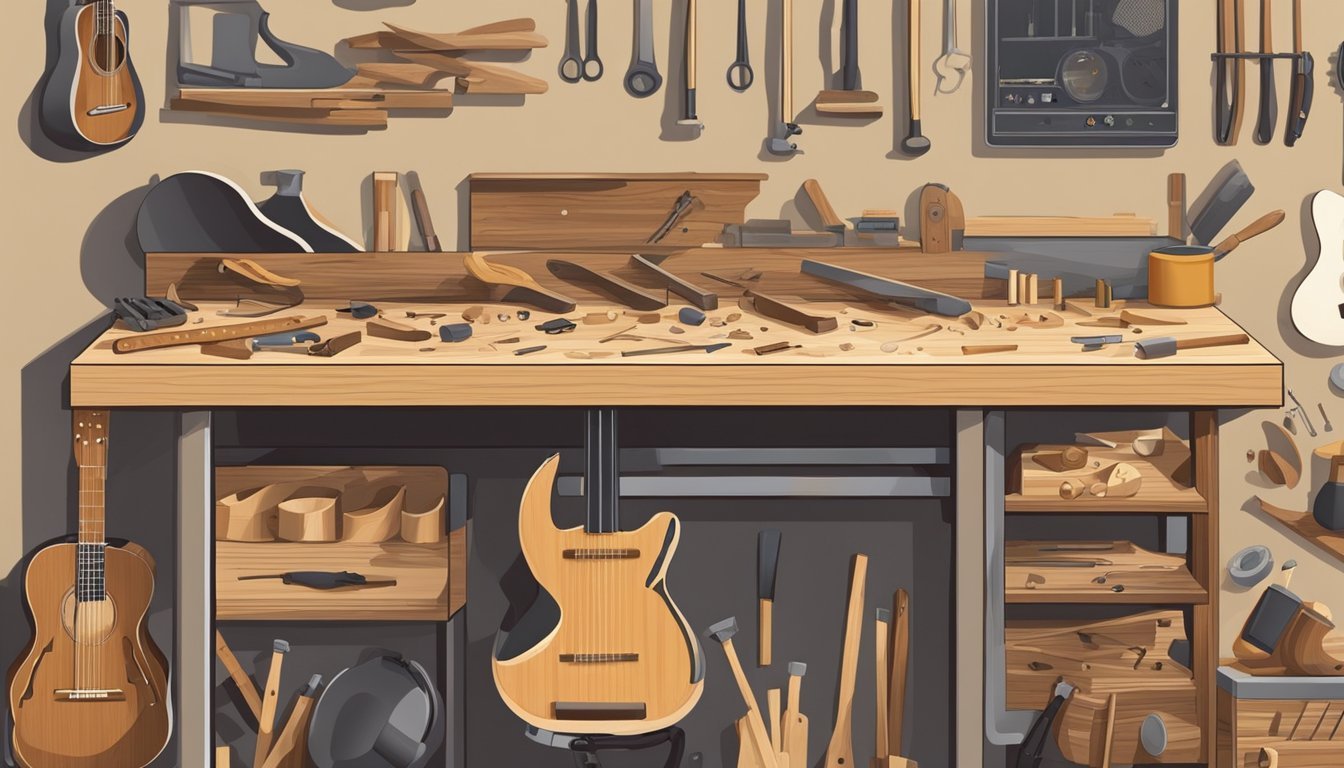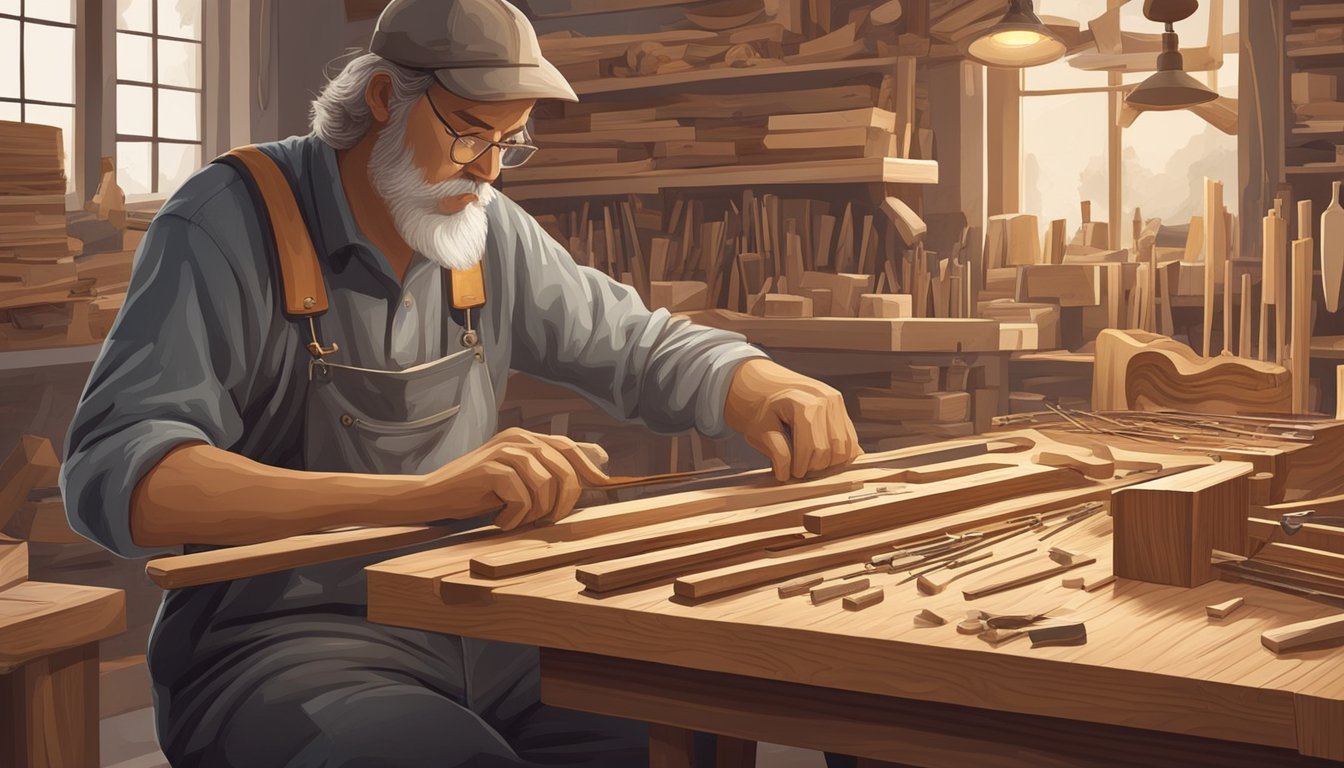Becoming a guitar luthier is an exciting journey for anyone who loves music and craftsmanship.
To start your path, you’ll need a mix of education, practice, and mentorship to master the skills needed to build and repair guitars.
Whether you’re looking to create custom instruments or fix up old favorites, there are many routes you can take to get there.

You’ll find that there are different ways to learn the trade.
Some people attend specialized schools that focus on lutherie, while others may choose to learn through online courses or by apprenticing with experienced luthiers.
As you dive into this world, you’ll discover the fun of working with wood, tools, and techniques that bring music to life.
Getting involved in the luthier community is also key.
Forums, workshops, and social media groups are great places to connect with others who share your passion.
With the right guidance and practice, you’ll be crafting guitars that resonate with musicians everywhere.
Key Takeaways
- You can learn guitar making through schools, online courses, or apprenticeships.
- Mastering the basics is crucial before exploring advanced techniques.
- Connecting with other luthiers can enhance your skills and knowledge.
Pathways to Becoming a Guitar Luthier
Becoming a guitar luthier involves a mix of formal education, self-teaching, and building connections in the industry.
You can choose from various paths that suit your learning style and career goals.
Luthier Schools and Apprenticeships
One of the best ways to dive into luthiery is through specialized luthier schools.
Institutions like the American School of Lutherie and the Galloup School of Guitar Building and Repair offer hands-on training with experienced instructors.
You learn techniques like fretwork, wood selection, and French polishing, which are all essential skills for crafting and repairing guitars.
Apprenticeships are another valuable option.
Learning from a seasoned luthier lets you gain practical experience and industry insights.
You might find opportunities at local shops or well-known brands like JS Bogdanovich Guitars.
Combining school and an apprenticeship can give you a well-rounded education.
Self-Education and Online Training
If traditional schooling isn’t your style, you can explore self-education.
There are tons of resources, including books and videos, that cover everything from basic guitar making to advanced repairs.
Platforms like the Guild of American Luthiers offer guides, articles, and a community that can support your journey.
Online training is also a growing field.
Websites provide online guitar building courses that teach you at your own pace.
Programs from places like the North Bennet Street School and Colorado School of Lutherie enable you to learn essential skills without the need for a physical classroom.
Certification Programs and Networking
Consider enrolling in a certification program to validate your skills.
Some schools, like the New World School of Violin Making, offer certificates that can boost your credibility in the field.
Networking is just as important.
Attend workshops, join guitar-making forums, and meet other luthiers through events hosted by the Guild of American Luthiers.
Building relationships allows you to exchange tips, find job opportunities, and even collaborate on projects.
Networking can lead to more practical skills and career prospects.
Fundamentals of Guitar Making
Guitar making combines a mix of artistry, craftsmanship, and technical skills.
To build a great guitar, you need to understand the instruments, the materials, and the techniques involved.
Understanding Stringed Instruments
Before you dive into guitar making, get to know stringed instruments.
Each type, like electric guitars or archtop guitars, has unique features that affect sound and playability.
Familiarizing yourself with these differences will not only enhance your appreciation for the craft but also guide your selections as you embark on this journey.
For those starting out, understanding the qualities of the best guitars for beginner players can help ensure a more enjoyable learning experience.
Consider factors like body shape, neck profile, and overall weight, as these elements can significantly impact how comfortable and accessible your guitar will be as you seek to develop your skills.
Focus on components like the nut and saddle, which help determine the guitar’s tone.
Understand how fretted strings work and the role of the fretwork in making sure notes sound just right.
By studying various stringed instruments, you’ll gain insights into what makes each design special.
This knowledge will lay a solid foundation for crafting your guitar.
Craftsmanship and Woodworking
Craftsmanship is at the heart of guitar making.
You’ll want to develop solid woodworking skills as you’ll work with various tonewoods.
Different woods can affect the sound, look, and feel of your guitar.
Start by learning about common woods like mahogany, spruce, and rosewood.
Each type has its unique properties.
As you improve your skills, try using hand tools and machines to shape your wood precisely.
Pay attention to details, as even small mistakes can change the sound of your instrument.
Guitar Design and Construction
Designing a guitar means understanding both aesthetics and functionality.
You’ll need to know how to create a balance between visual appeal and sound quality.
Consider aspects like the guitar’s body shape, neck design, and the scale length.
Each choice plays a crucial role in how the instrument performs.
Plan your construction process carefully.
Start with a solid outline, then move on to assembling parts like the body, neck, and hardware.
It’s essential to keep learning from master luthiers or taking courses to refine your techniques.
The more you experiment and create, the better your guitars will sound and look.
Advanced Techniques and Specializations

As you dive deeper into the world of guitar luthiery, advanced techniques and specializations become essential.
These skills not only set you apart but also enhance your craftsmanship.
Here’s a look at some key areas to focus on.
Fretwork and Fine Detailing
Fretwork is one of the most critical skills for a luthier.
It involves shaping, leveling, and polishing the frets to ensure proper playability.
Attention to detail matters here.
Uneven frets can lead to buzzing and affect the overall sound.
You might consider learning from experts like William Cumpiano or Charles Fox.
Their techniques emphasize precision, which is vital.
You’ll gain hands-on experience through apprenticeships, where you can practice these skills in a real-world setting.
Don’t forget about the importance of finishing touches.
Properly dressing frets and ensuring a smooth neck can greatly improve your instrument’s playability.
Creating Custom Instruments
Creating custom instruments is where your creativity shines.
This is about more than just building a guitar; it’s about crafting a unique piece that fits the musician’s style.
You’ll use various woods and materials to design something truly special.
Each project requires problem-solving and knowledge of sound dynamics.
Understanding how different wood types affect tone can elevate your work.
Schools like Hawkins Guitar Luthier School provide excellent training for budding guitar makers to explore this field.
Consider reaching out to local shops or luthiers for collaboration.
Working with others in the industry can provide new insights and techniques.
Restoration and Repair Skills
Restoration and repair skills are crucial for any luthier.
Many musicians rely on professionals for their damaged instruments.
Understanding the art of musical instrument repair not only helps you fix issues but also teaches you about instrument construction.
You’ll learn techniques for repairing cracks, replacing parts, and refinishing surfaces.
Regularly practicing these skills in a repair shop setting can enhance your expertise.
Some luthiers, like Tom Bills and those at Hart’s Guitars and Lutherie School, focus intensely on this area.
The ability to restore vintage guitars or beloved instruments can also build your reputation.
Musicians often seek reliable luthiers who can bring their cherished guitars back to life.
Frequently Asked Questions
If you’re thinking about becoming a guitar luthier, you probably have a few questions.
Let’s dive into the specifics about training, apprenticeships, schools, job markets, salaries, and costs.
What kind of training do I need to become a luthier?
There are different paths to become a luthier.
You can attend a specialized luthier school or opt for self-study through online resources and books.
Hands-on experience is also crucial, so getting practical training is a big part of the journey.
Can you do an apprenticeship to learn guitar luthiery?
Yes, apprenticeships are a great way to learn.
Working under an experienced luthier gives you real-world experience.
It allows you to pick up techniques and tricks that you won’t find in books.
Are there any specific luthier schools or programs I should look into?
Several schools focus on luthiery.
The American School of Lutherie and Guitar Craft Academy are two options that provide in-depth programs.
They offer both classroom and hands-on training, helping you build a solid foundation.
Is there a strong job market for guitar luthiers?
The job market can vary.
While there’s always a demand for skilled luthiers, it largely depends on your location and networking.
Many find work in music shops or start their own businesses.
What is the average salary for a guitar luthier?
Salaries can range widely based on experience and location.
Entry-level luthiers may earn around $30,000 a year, while experienced professionals can make over $60,000 or more.
How much can it cost to attend a luthier school?
Tuition costs for luthier schools typically range from a few thousand to over $20,000.
Prices differ based on the institution and the length of the course, so make sure to research each program.

